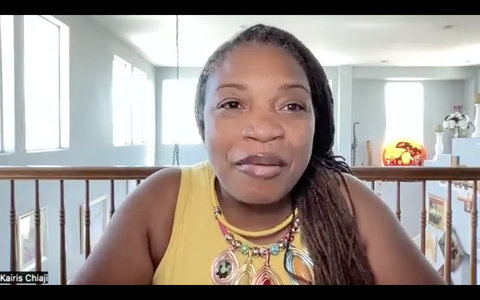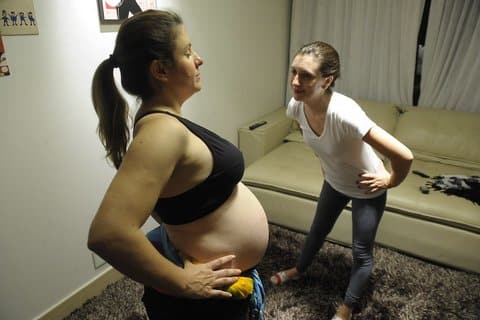
03 Jul Doulas Provide Much-Needed Tradition of Support to Birthing Parents

Kairis Chiaji, who has been a doula for 25 years, says part of her job is to “help make sure the mama with melanin is going to be OK and that if she’s not OK, that somebody knows, that somebody does something about it.” (Screenshot captured by Danielle Parenteau-Decker / CC Pulse)
By Danielle Parenteau-Decker
Pregnancy is one of the most complex and paradoxical experiences a person can go through. It can result in something many people call the greatest joy of their lives: the birth of their child. But it can also be a scary, confusing and painful time that leaves the pregnant parent feeling ignored, misunderstood and mistreated — especially if that parent is Black or Indigenous — and that can be deadly.
So California has decided to try something new to help parents navigate that complexity and improve birth outcomes. Though, really, it’s not new at all.
Since Jan. 1, 2023, Medi-Cal has covered doula services for members while they are pregnant and for 12 months after their pregnancy has ended. A year and a half on, Ethnic Media Services hosted a state Department of Health Care Services worker and two doulas to discuss the benefit and why it’s needed.
“All Medi-Cal members are eligible to receive coordinated care from the start of the pregnancy through 12 months postpartum, which will help birthing individuals and their children navigate things like prenatal checkups during pregnancy, birth plans and mental health treatment like postpartum depression,” said Erica Holmes, who heads the DHCS Benefits Division.
A doula is a trained non-medical professional who “provides emotional, physical, and educational support to a [parent] who is expecting, is experiencing labor, or has recently given birth,” according to the American Pregnancy Association.
“I would liken it to a personal trainer but for childbirth,” said Kairis Chiaji, who has been a doula for 25 years. “So our job is to get to know you, get to know what your goals are for your body, for your baby, and help you come up with a plan and then help you remember that plan.”
Doula services are seen as nontraditional care because they are not a part of the typical medical approach to pregnancy and childbirth. But the two can coexist. And having a doula is traditional.
“It is an ancient practice,” Chiaji said. “It is actually the original way of supporting birth.”
Khefri Riley, a doula who has worked in the maternal and infant advocacy field for over 23 years put it into context.
“When you think about doulas or birth workers, they really are coming from a historical lineage from the Black grandmother midwives or Indigenous midwives or midwifery, in general, so this is not some new thing,” she said. “This is actually rooted in traditional care of families. It is a community practice. It is healing work. It is radical. It is natural. It’s a cultural inheritance.”
Doulas help people navigate an aspect of the pregnancy process that is part of the norm but shouldn’t be.
“I know each and every one of you on this call can discuss a birth experience in your family or family lineage that you wish had gone differently,” Riley said, “that you wish were treated differently, that you wish you were heard and listened to, that your sister or mother, auntie had an experience that she wished were different.”
Black Infant Health Helps Black Moms ‘Give Birth the Way She Wants’
Riley said providing doula services as a Medi-Cal benefit is “rooted in reproductive justice” for all people but especially for Black and Indigenous parents “because that’s where the highest disparities lie.”
“It does not make any sense that a Black birthing person have to worry that they are three to five times more at risk of dying in childbirth in 2024,” she said. “Institutional racism and structural racism has created this problem, and many of these deaths are preventable.”
Indeed, as Chiaji said, “our country and our state are in a maternal health crisis. There are injuries and losses that statistics say 80% of which are preventable.”
That number comes from an analysis by the Centers for Disease Control and Prevention, which also found that 90% of deaths among Indigenous birthing parents were preventable and that nearly a third of the people who died in the period studied were Black.
Q&A: At Black Infant Health, ‘There’s Something We Can Do to Support That Family’
So while the only requirement to be Chiaji’s client is that “you are pregnant and you are going to give birth,” one of her goals is to “help make sure the mama with melanin is going to be OK and that if she’s not OK, that somebody knows, that somebody does something about it.”
That attitude was inspired by a personal event.
Chiaji said she saw someone medicate her sister-in-law “without saying a word, and that woke up the advocate in me, and I knew from that moment on, never again, not on my shift.”
Part of a doula’s job is to help make sure their client understands what their doctor is telling them.
“The department wants to ensure every birthing individual is informed and can take control of their health journey,” Holmes said.
To help achieve the latter, a doula also helps ensure that the doctor listens to what the patient has to say.
“You do not have to feel afraid or alone, and your voice does not have to be silenced but uplifted and centered,” Riley said.
If you are pregnant and on Medi-Cal, you can consult DHCS’ Doula Directory, which lists providers by county along with their contact information, specialties, ethnicity, pronouns and languages spoken.






No Comments